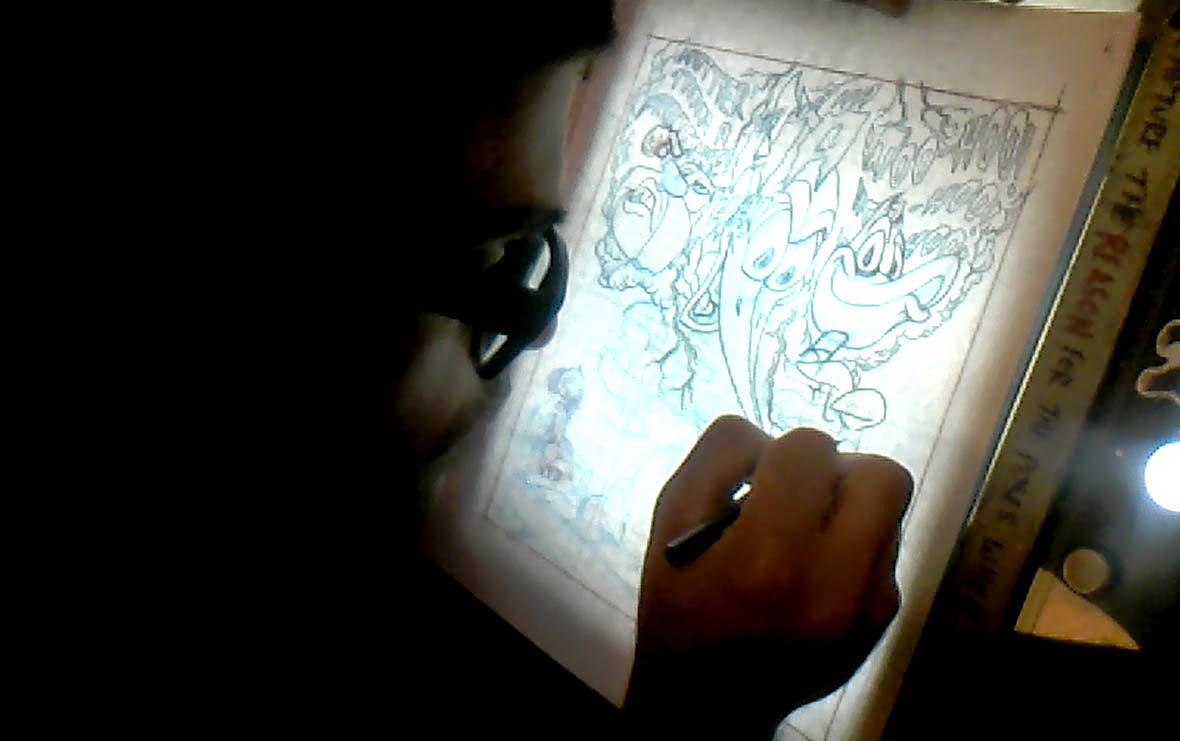One of my strongest most undeniable influences is the LooneyTunes. Their madcap hysterics brought about more enjoyment and laughter in me
than any other cartoons I can think of.
Daffy Duck from the franchise is my favorite cartoon
character of all time. Both his blitz beginnings and conceited conduct arrested
my young developing mind. When I discovered Woody Woodpecker afterwards, I
enjoyed his early disposition much better: a brash bird with far too much
energy. Over time, I found he became heavily gentrified and his cartoons became
tamer. Screwy Squirrel is a short lived brain child of one of my heroes, the
late great Tex Avery. Only appearing in
five official cartoons and discovered by me while exiting my teens, the character
is lesser known to many and has the most abusive antics of the three.
These cartoon characters didn't
just make ME laugh - they had prominent laughs themselves! Woody Woodpecker's laugh is indelible - if you've heard it once, you know exactly who it belongs to. Daffy's 'WOO-HOO-HOO-HOO' laugh is manic
and memorable. Screwy's laugh is not as renowned - but certainly taunting. The
idea of combining the three of them into a homage painting united by their
wacky laughter sat in my conscientiousness for over two years before I would
begin the painting.
But the laughter these characters generated in their
cartoons was always at someone else's expense.
Far later in my development, I realized Daffy Duck, Screwey
Squirrell and the early Woody Woodpecker were not just pests - they were
bullies. Each of them exerting a
combination of physical, verbal or psychological abuse on their chosen victim
the whole time LAUGHING while doing
it.
But why do we have such vicarious desires over such disrespectful
behavior in the first place? The answer I believe is because cartoon characters
exemplify our inner selves. They perform acts we would love to do - but could
never get away with. It's important to note, behavioral traits (both good and
bad) in cartoons characters are inspired by real people.
As much as I admired Daffy, Screwy and Woody's frantic
antics, I developed a sense of sympathy for Porky Pig. In cartoons, he would
frequently appear timid, ambivalent and taken advantage of. I also think the
act of being bullied, is something generally everyone can relate to. Perhaps on
both sides of the spectrum. (Myself, I admit, there are times I wasn't exactly
an angel to my sisters growing up .)
Many an animated cartoon would end with a character literally
'going crazy' - in some cases even incarcerated - by the antics of another. In the painting, Porky has been driven to the
point of madness where he now must seek help from his abuse. The act of
confessing maladaptive struggles to a psychiatrist was nothing unfamiliar with
me either. Myself, having undergone therapy sessions on two separate occasions
before the ripe age of sixteen.
A conversation in late July 2014 with one of my best friends
and concept artist, Tony Mitchell, reminded me that pink is the official color of anti-bullying. This sprang from a campaign started by two males while in
High School (coincidentally from my province of birth and development, Nova
Scotia) who organized a pink shirt wearing rally in support of a younger student
bullied on his first day in school for wearing a pink shirt to class. With that
information, I thought it would be appropriate to work the color pink into the image somehow. Porky is
already a pale pink - so that worked out
conveniently. His three oppressors in the clouds are cast by an eerie pink
light and their taunts at full spectrum. Also, Ludwig Von Drake (who plays the
psychiatrist in the painting) dons a pink shirt.
I think both cartoons and psychology have interested me
because cartoons have influenced the behavior of generations of children in
ways no one ever really intended. I've forged not only a sense of desire and
empathy for cartoon characters I grew up with, but some of my fondest memories
to date. Perhaps there's something very unsettling about that. I've accumulated real world emotions over
characters that don't even exist. There is a part of me that tries to battle
the reality of knowing I can never actually meet them. And for me, painting
them is an act of spending time with them.
-Jono Doiron





No comments:
Post a Comment